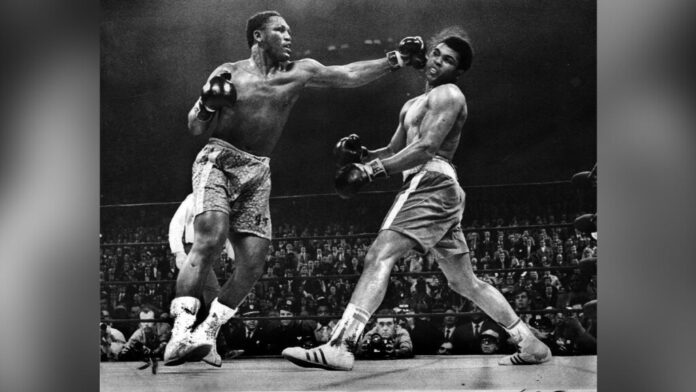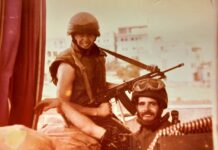In my previous two articles on boxing’s greatest fight trilogies, I covered iconic rivalries between such greats as Rocky Graziano, Tony Zale, Arturo Gatti, Micky Ward, Floyd Patterson, and Ingemar Johansson. But those bouts, whilst showcasing amazing boxing talent and courage, were missing something key that elevates an already spectacular rivalry to a level of intensity unseen before.
That missing element was simple: hatred. Whilst all previous rivalries mentioned were competitive, with both fighters giving it their all, there was a healthy level of respect and integrity involved between the two. But in my number one pick for Boxing’s greatest trilogy, no such cordiality existed, only spite.
Ali vs Frazier not only saw two boxers seeking to prove their combat superiority over each other, it also incorporated a uniquely personal aspect into the fight game – an ugly period of boxing history that would see three merciless showdowns and the near deaths of boxing’s two greatest fighters.
Before I begin, I would like to thank numerous Jesuit faculty for their support regarding these boxing articles, such as Dr. Degen, Mrs. Row, Mr. Fitzsimmons, Mr. Shoemaker, Mr. Hanley, and Ms. Evans. Their helpful feedback, open access to research material for future articles and photos, and general encouragement have not only brought me enjoyment in writing these articles but also ideas and resources for future articles.

#1: Ali vs Frazier
The Golden Age of Heavyweights was a time period in the mid-1960s to mid-1970s widely regarded as the most exciting era in heavyweight boxing history. The heavyweight division (which during the 1960s was for fighters that weighed anything above 190 pounds) saw its most competitive years by far, and that is largely thanks to the frightening pugilistic displays put on by Joe Frazier and Muhammad Ali.
It’s fair to say that Joe Frazier grew in the shadow of the rising star, Muhammad Ali. The latter boxer, who had switched his name from Cassius Clay to the Islamic Muhammad Ali, had won the heavyweight crown in a decisive fashion in 1964 and dominated the heavyweight division since then.
Ali’s boxing excellence arose from near-superhuman speed (so far been recorded as the fastest boxer in recorded history), reflexes, head movement, as well as dazzling footwork, and a brilliant ring IQ that allowed him to be 2 steps ahead of his opponent at all times. Ali was a showboat in the ring, taunting his opponents and performing gestures to goad the crowd into the spectacle.
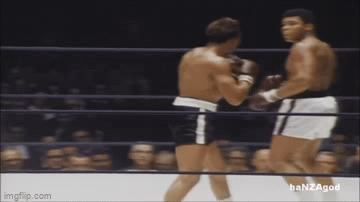
Possessing an outgoing attitude outside of the ring as well, Ali would attempt to mentally psyche out his opponents by harassing them in public venues and at press conferences. His conversion to Islam made him few friends; moreover, he was an outspoken civil rights advocate and critic of racial segregation in the United States, at a time when the country remained hotly divided among political lines.
Amidst the press coverage regarding Ali and his antics, a rough-and-tumble heavyweight was climbing the ranks. His name was Joe Frazier, a South Carolina farmboy who had his left arm torn apart by a hog in an accident. Alongside his maiming, Frazier also drew the ire of several townspeople who allegedly planned to lynch the black youth. Fleeing to Philadelphia to escape a life of deprivation, violence, and poverty, Frazier worked in a slaughterhouse and eventually found his way to a boxing gym.
“Frazier possessed the strength, willpower, and courage necessary to become successful.”
A boxing trainer by the name of Yancey Durham saw potential in the short, chubby Frazier when few else did. As Charley Goldman did to Rocky Marciano, Durham realized that Frazier possessed the strength, willpower, and courage necessary to become successful.
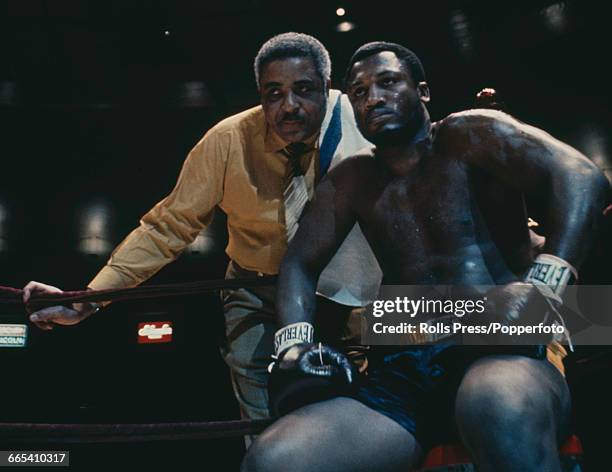
Frazier was short, at around 5’11. At his natural fighting weight, he was around 205 pounds. His reach – 73 inches – was short for a heavyweight. But Durham realized that Frazier, because of the crookedness of his left arm (which never healed from the hog attack), could more easily throw left hooks, because his arm naturally rested in that position anyway. Frazier also was a workhorse in the ring, with unbelievable stamina, a man who in the words of an opponent would: “Attach you to your sides and beat the hell out of you!”
“[Frazier] just attaches to your side and beats the hell out of you!”
Durham transitioned Frazier into a bobbing and weaving fighter, a style that had the young man fight in a crouch, ducking under his opponents’ punches. Frazier would use this position to leap forward with his signature left hooks, turning the crouch into both a defensive and offensive posture. Because of his tendency to get stronger as the fight went on, Frazier soon adopted the nickname “Smokin” Joe Frazier.
Frazier, like Ward and Gatti, also harnessed an inner warrior spirit to his advantage. Taking pleasure from the thrill of combat, Frazier would often be seen smiling in the ring. He never backed down or doubted himself, and like Marciano, never gave in when he was under pressure. “I want to hit [my opponent]… step away and see him hurt,” the boxer would utter, “I want his heart.” Jack Dempsey, who had his own history as a ferocious brawler in his era, was in awe of Frazier. “He is the ultimate warrior,” the Manassa Mauler believed.
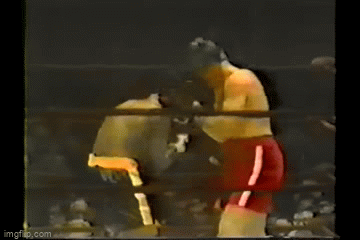
With these skills set in stone, Durham unleashed Frazier on the heavyweight division. Winning 11 fights in his first year as a pro, Frazier then went on to demolish top-ranked contenders such as Oscar Bonavena, George Chuvalo, and Doug Jones. It seemed a confrontation between the reigning King Muhammad Ali and the rising star was inevitable. Joe Frazier confidently told his trainer that “I feel I can whip [Ali].”
But then the unexpected happened. In 1967, Muhammad Ali refused to be inducted for the draft for the Vietnam War, famously quipping “I ain’t got no quarrel with them Viet Cong.” For this, he was stripped of his heavyweight title and convicted of a felony, and he fled the country in exile. The champion was gone, and a power vacuum emerged in his place.
:quality(70)/arc-anglerfish-arc2-prod-tronc.s3.amazonaws.com/public/ZUB6MHKPLREJ7ANG6US3MZHSDA.jpg)
Top-ranked contenders such as Jimmy Ellis, Jerry Quarry, Buster Mathis, Floyd Patterson, and more fought it out to see who would be the new heavyweight champion. Frazier destroyed them all to win the crown vacated by Ali, winning all of his subsequent bouts by knockout. Even as he won the title, Frazier never forgot about the former champ. He petitioned major boxing commissions to award Ali his boxing license so he could re-enter the sport, to no avail.
“Ali, as usual, made the fight a theatrical performance.”
But Ali came back on his own, winning a Supreme Court case that turned over his draft dodging conviction and made a comeback to boxing in 1971, winning two fights against top-ranked contenders. Even though it had just been a few months since his return, and he had been absent from the sport for 3 years, Ali was quickly shuffled in as the top-ranked contender. Frazier, now heavyweight champion, was ready for the fight. But Ali, as usual, made the fight into a theatrical performance.
Ali seemingly forgot all about Frazier attempting to return his license to him. Instead, he attempted to frustrate and intimidate his opponent. As FightCity reported, “Ali went to great lengths to denigrate Frazier and isolate him from the black community, branding him as “Uncle Tom” and “the white man’s champion.”

The criticism came out of Frazier’s patriotism towards his home country, conservative family values, and devotion to Christianity, which Ali utilized to paint a stark contrast between himself and the champion.
Frazier’s response, simply put, was vengeful. “When he wanted me to help him get a license, I ‘tommed’ for him. For him!” Smokin’ Joe would later recall in 1996, “but he betrayed my friendship … I sat down and I said to myself, I’m gonna kill him. Okay? Simple as that. I’m gonna kill him.”
“I sat down and said, I’m gonna kill him. simple as that.”
Ali’s taunts, in the past, seemed to intimidate his opponents. But this time, he only rattled the tiger’s cage, and he would pay for it. While Ali confidently boasted to reporters that he would “whup this fool” as he walked to the ring, Frazier quietly fumed in his room, praying to God that He would allow Frazier to kill Ali in the ring.
Fight fans and critics had already labeled the bout – one of the few championship fights between two undefeated boxers – the “Fight of the Century.” It would live up to the moniker.

From the beginning, Frazier rushed in on Ali, who was able to fire off rapid-fire combinations that tagged the champion. Yet early on, it seemed that Ali had found himself on an entirely new battlefield, and he would pay for it. Frazier, utilizing his bob and weave style, was able to throw his trademark left hook with a debilitating effect. Tirelessly moving on, Frazier was described by a sports commentator as a “Sherman tank… he never stops punching!”
“Frazier is like a sherman tank! He never stops punching!”
By Round 6, Frazier had taken firm control of the fight, battering Ali so severely that his jaw began to swell. Despite a valiant effort by the former champion, Frazier was simply too much. His fury at Ali propelled him into superhuman feats of endurance, as he simply got stronger as the fight went on. Ali, usually a showboater in his boxing matches, was returning to his corner a defeated man. Frazier, usually calm and collected, was smiling and mocking Ali.
By Round 15, it was all but certain that Frazier would win by a decision – if it got that far. Ali came out, desperate for a knockout to save himself from his first defeat, but it was too little, too late. Frazier leaped forward with a beautiful left hook that flattened Ali. “It was about as hard as a man could get hit,” the referee would later state. Nevertheless, Ali got back up, but he lost by unanimous decision.

Frazier triumphantly jeered at Ali as he left for his locker room, screaming “I kicked your ass!” Frazier had won, as one writer put it, “won one of the single greatest victories in the history of the sport.” But it had come at a terrible cost – Frazier would spend the next month in the hospital owing to the swelling and fluid loss during the bout.
For the next three years, the two fighters didn’t encounter each other in the ring. Ali had to slowly climb the top contender ranks, whilst Frazier comfortably sat at the top until he was demolished in a 2nd round knockout by the up-and-coming George Foreman. Now Frazier was where Ali was – without a crown. To earn a chance at challenging “Big George,” the two would have to meet again. Neither was hesitant to do so.
Ali v Frazier II was not as exciting as the first, primarily because Ali kept it far more competitive, and Frazier had slowed down significantly as a fighter by then. Ali, like Gatti did against Ward in their rematch, used his mobility far more than in the first fight. Whenever Frazier came in and dealt damage with the left hook, Ali would clinch up and prevent Frazier from going to work.

Although Frazier was able to temporarily crack Ali’s defensive shell near the later rounds, it was not enough for Ali to win by a comfortable decision. Joe Frazier and his new trainer, Eddie Futch, complained bitterly that Ali’s holding and grappling – not his actual fighting prowess – had carried the day. But such complaints fell on deaf ears.
That same year, Ali would defeat George Foreman in one of the biggest upsets in history, and Frazier, despite the recent defeat, was seen as a logical contender for the heavyweight championship.
The fleet-footed fighter, realizing that none of his past insults seemed to work on Frazier, did not attempt to back off in his derogatory insults. Rather, he intensified his proliferation of insults toward his two-time opponent. “There’s gonna be a thrilla, with a gorilla, in Manila!” Ali cried out in a talk show.
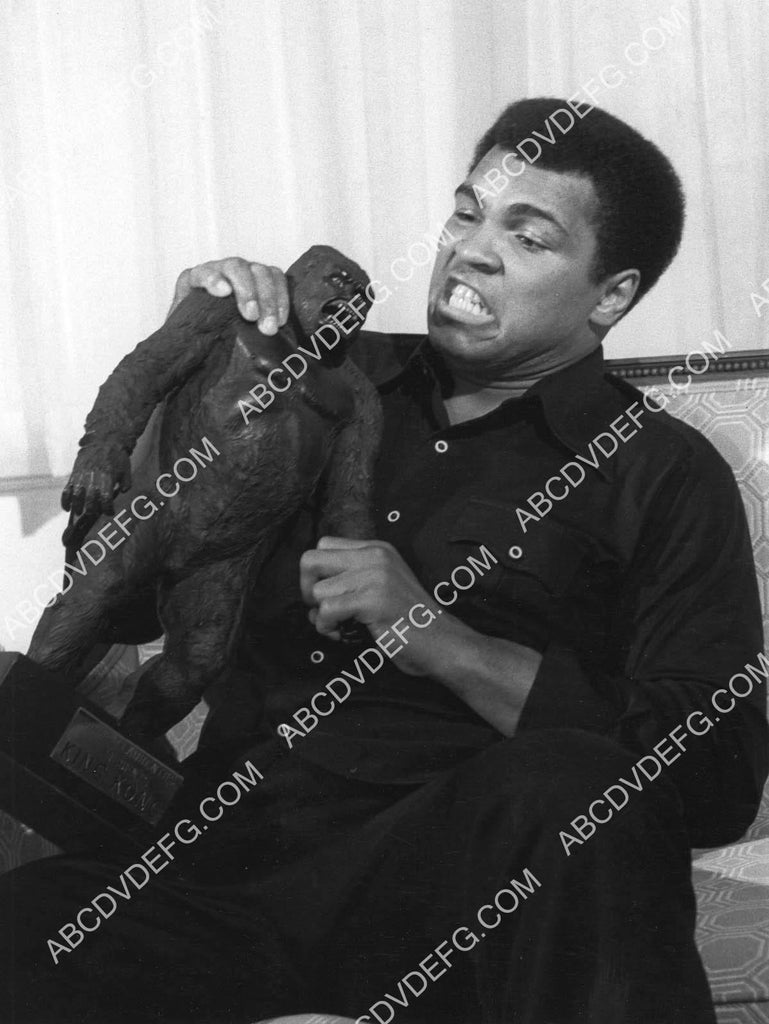
That word – gorilla – was actually never meant to be stated, especially because of its connotations in calling that towards a black person. But Ali thought it sounded good with his rhyme scheme, and thought nothing of it, and so kept using it to describe Joe Frazier. The blinding rage that Frazier experienced toward Ali was quickly eclipsed by what he felt now. With his body aging over time, Frazier felt that this was his last opportunity to “kill Clay.”
“It was the closest I ever felt to death.”
The final bout between these two great warriors came on October 1st, 1975, in Manila, Philippines. What would later be named Ring Magazine’s Fight of the Year started quickly as Ali, as he did in the first fight, sought to stay flat-footed and pound away at Frazier, hoping for a quick knockout. But Frazier took the punches head-on, and by the mid rounds, he was bludgeoning away at Ali’s sides as the champion gassed out on the ropes.
Ali endured horrific punishment on the ropes as Frazier etched away with hard blows to the body. To add to the already hellish conditions both fighters languished under, the weather in Manila soared to 125 degrees. “It was like inhaling a furnace every time you took a breath,” Frazier would later say. But “Smokin” Joe never backed down.
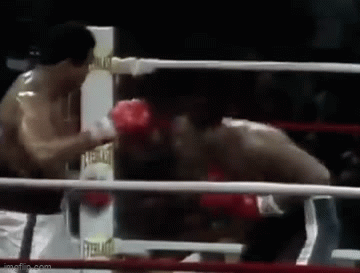
“I was just trying to pound at anything I could get my hands on, whether it be arms, body, head, anything, like Rocky Marciano, used to do,” Frazier would write in his autobiography. Ali was unable to clinch with Frazier as he had done in his previous bouts because the referee forbade him to do so, and thus Ali was backed into corners by the indomitable Frazier. His body exhausted from the heat and Frazier’s inexorable assault, Ali saw his physical endurance tested to the limits. “It was the closest I ever felt to death,” is how he described it.
Despite the lead he had maintained, Frazier began to tire out, his older age and the heat catching up to him. Ali, who had just rested on the ropes whilst being battered by his opponent, now had reserves of energy he could employ to take the lead. “You gotta save up energy during these long fights,” Ali would later say, “even if you take a beating for a few moments, you’re saving up energy for the long term.”
Ali’s prudent decision-making worked, and although his ribs were bruised from the prior shellacking, by the final rounds he possessed enough stamina to turn the tables on his attacker. Ali began to counter Frazier’s slowing head movement with pinpoint jabs and counter rights, a debilitating trend that continued for the next three rounds.
By the 15th round, Frazier’s eyes had swollen shut and his head was “virtual target practice for Ali.” When the two men returned to their corners, each was on the verge of collapse.
Muhammad Ali, feeling nauseous and drowsy, requested that his gloves be cut off and for himself to be carried from the fight, essentially quitting the bout and allowing Frazier to claim a victory. But such a measure would prove unnecessary.
“I want him boss! I want him!”
Eddie Futch, Frazier’s trainer, saw the pitiful shape his fighter was in. Frazier’s eyes, swollen shut, were beginning to bleed profusely, leaving him virtually blind. He was gasping for breath in the scorching heat and had no more gas left in the tank. Futch had seen fighters die in the ring before, and he wouldn’t let it occur again.
Futch told his man, “Joe, I’m going to stop it.” Frazier cried out in response, “No, no, Eddie you can’t do that to me!” But the trainer rebuked him, saying “You couldn’t see him in these last rounds,” but he was cut off by Frazier yelling out “I want him boss! I want him!” Futch, placing a hand on the exhausted warrior’s shoulder, calmly said, “It’s all over Joe, No one will forget what you did here today.”
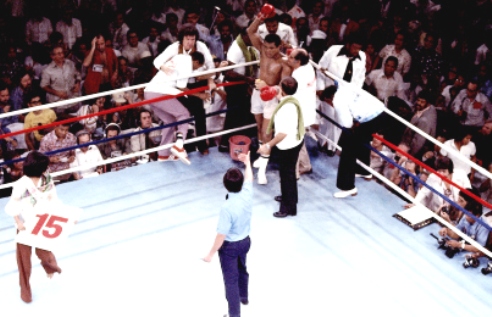
Futch then threw in the towel, ensuring Muhammad Ali would win by 14th-round technical knockout. The widespread consensus amongst boxing historians and doctors was that if the fight had continued, then one of the fighters would have died in the ring.
But instead, the legendary trilogy between the two had ended. However, their embattled relationship, so full of animosity and spite, did not conclude there. Despite lavish praise given by both men after the fight, everything did not return to a benevolent friendship, as it did with Gatti and Ward. Rather, Frazier remained forever spiteful of Ali for his insulting and demeaning actions made throughout their rivalry.
Whilst Ali would publicly retract those hateful statements, Frazier still never forgave him. Smokin’ Joe retired from the sport of boxing soon after, but privately, he never forgot the humiliation he endured from Ali. In numerous interviews throughout the 1980s and 90s, he would demean Ali at every chance he got, even as the latter spoke highly of him.
“Truth is, i’d like to rumble with that sucker again – beat him up piece by piece and mail him back to jesus.”
Even with Ali began to develop Parkinson’s Disease – a neurological condition likely caused by the tremendous brain damage suffered in the ring – Frazier cared little. In one interview Frazier muttered: “Truth is, I’d like to rumble with that sucker again—beat him up piece by piece and mail him back to Jesus…. Now people ask me if I feel bad for him, now that things aren’t going so well for him. Nope. I don’t. Fact is, I don’t give a damn. They want me to love him, but I’ll open up the graveyard and bury his ass when the Lord chooses to take him.”
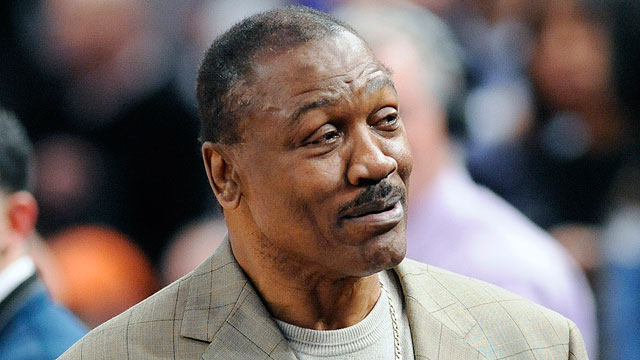
Their relationship had been reversed, with Ali now being the seemingly benevolent actor of the pair, and Frazier berating his former rival for no just cause. Frazier took his hatred of Ali to the grave. The man who Jack Dempsey had so endearingly called “the ultimate warrior,” died of liver cancer in 2011. He was only 67 years old.
Ali seemed to forever regret not only his actions towards Frazier but also the fact that the two never reconciled. He would later die from a respiratory illness in 2016, at the age of 74.
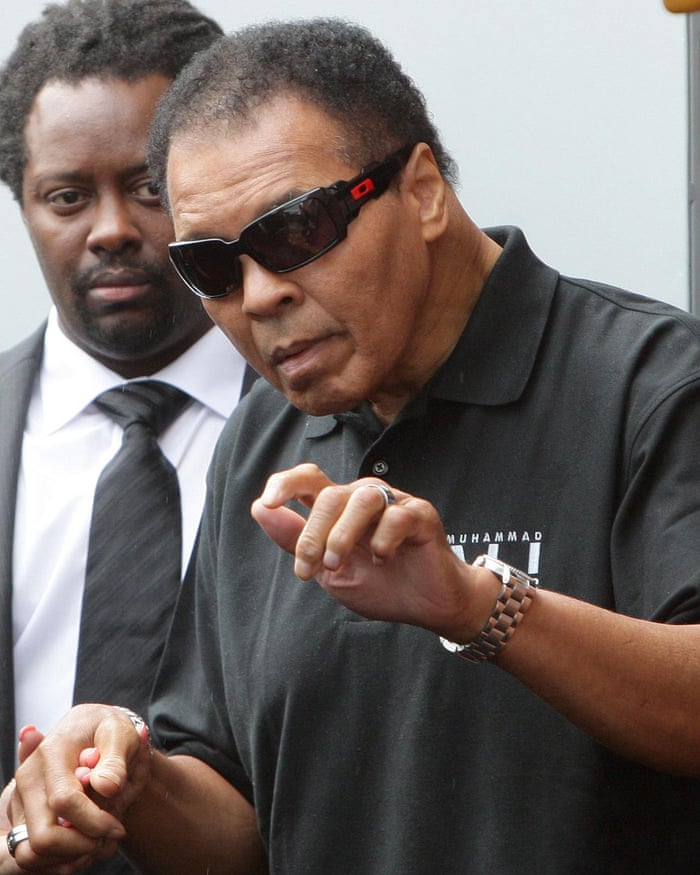
The two’s personal vendetta set the stage for undoubtedly sport’s greatest rivalry. The heart, effort, and soul put into each fight between the two will be forever remembered by fans. And the trilogy not only proved the legendary feats of athleticism both men were willing to reach, but also presented one of the greatest moments in sports history when two exhausted fighters had to be physically stopped by outward intervention, and not because of their own self-doubt or limitations.
Stay tuned to the Jesuit Roundup for more boxing and sports coverage!
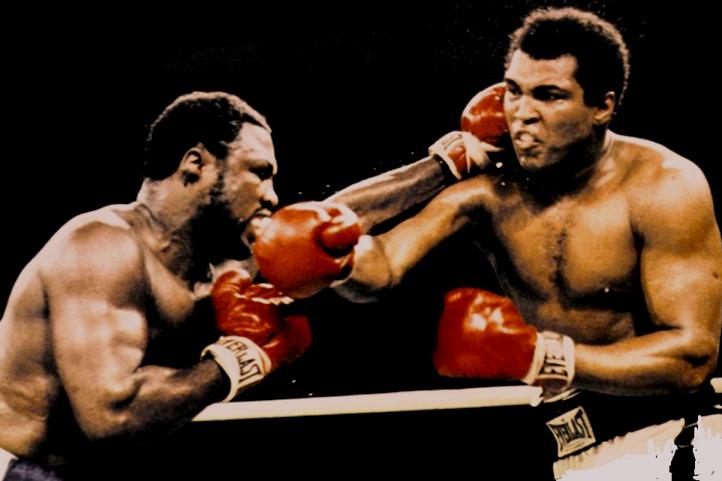
Previous two articles in my series on Boxing’s greatest fight trilogies:
Third Time’s the Charm: Boxing’s Greatest Fight Trilogies Pt. 1


